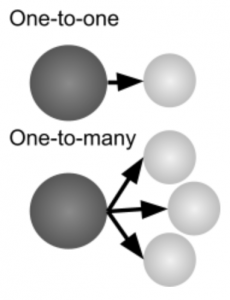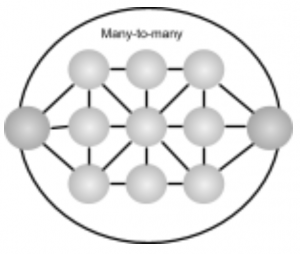Types of PRSS
There are various types of peer recovery support services (PRSS). General categories include mutual aid, recovery management, and social model recovery.
Mutual Aid
Mutual aid is a form of peer-based recovery support that is free, non-professional, and reciprocal (e.g., two or more individuals in recovery helping each other).
Mutual-help societies or organizations (sometimes called self-help groups) can be sorted into three types:
- Spiritual – e.g., 12 Step (AA or NA)
- Religious – e.g., Celebrate Recovery
- Secular – e.g., SMART Recovery, Women for Sobriety, LifeRing
Each mutual-help society has its unique culture, which shapes its memberships self-identity, beliefs, perspectives. Mutual aid (self-help) is the most widely used resource amongst individuals who need substance use treatment (NSDUH). A growing body of research shows the positive effects of mutual aid on relapse prevention and recovery (Kelly).
Person-Centered Recovery Support
 Person-centered recovery support understands that individuals have diverse and changing needs and that one size does not fit all. As such, RM focuses on a relationship with self, encouraging individuals to conduct self-assessments and seek outside resources to meet personal needs. Recovery management is delivered by trained, often certified, and supervised staff who focus on the needs of the individual, using person-centered planning. Similar to clinical services, recovery management is delivered through time-limited and scheduled events using one-to-one or one-to-many dynamic.
Person-centered recovery support understands that individuals have diverse and changing needs and that one size does not fit all. As such, RM focuses on a relationship with self, encouraging individuals to conduct self-assessments and seek outside resources to meet personal needs. Recovery management is delivered by trained, often certified, and supervised staff who focus on the needs of the individual, using person-centered planning. Similar to clinical services, recovery management is delivered through time-limited and scheduled events using one-to-one or one-to-many dynamic.
Social Model
Social model recovery focuses on connection, meaning the quantity and quality of relationships between peers and a community (microsystem) of peers. The social model encourages individuals to conduct community assessments and consider the needs of the many. It believes in congruence (harmony) mutuality and the interdependence of peers, microsystems, and macrosystems. As such, it promotes reciprocal responsibility, mutual aid, and citizenship. Social model support is delivered by participants and staff mentors guided by cultural norms and policy set through peer governance. Since the setting is the service, support is readily available when individuals are in need.
Although recovery is a personal journey, individuals do not experience it alone. Research reveals that two fundamental interpersonal processes are at work in recovery groups or communities:
- Social learning, in which role models provide examples of how to live recovery.
- Social control, through which members learn and conform to a recovery group or community’s norms.
The social model offers an experiential learning process. First, participants are introduced to new information and/or observe behaviors. Next, they practice implementing the information or behavior.
Reflections: We invite you to reflect and journal on the following questions.
